- Home
- Gavin Chappell
Our Man in Alexandria Page 5
Our Man in Alexandria Read online
Page 5
The shink of drawn swords cut through the clamour of the rioters.
‘Charge ‘em, the blighters,’ said Marcus Pertinax calmly. For all his languorous airs, he didn’t lack courage. They raced down the street towards the mob, swords in one hand, shields in the other. Flaminius sprinted at Marcus Pertinax’s side, gritting his teeth. Ozymandias ran along with them, but what a barefooted Egyptian scribe hoped to achieve in the middle of a riot, Flaminius couldn’t guess. So much for avoiding bloodshed. It looked like Marcus Pertinax intended to show no mercy, and they were trapped.
With a great crash, the Romans met the line of rioters. Men wearing little more than chitons and armed with clubs or stones flung themselves at men in full armour. Swords flashed in the dusty sunlight, and this time no one used the flat. Blood sprayed. Men shrieked. Men fell. Blood ran down the gutters.
Flaminius saw Ozymandias fighting with a Green, a knife in his hand, although where he had got it from the tribune could not guess. They hacked and stabbed at each other wildly with hatred clear on their faces, the hatred of centuries-old ethnic conflict. Flaminius was grabbed by three rioters who seized his shield or his cloak, and tried to drag him down to the cobbles so they could pound in his skull with rocks or knife him.
He pulled away, then hacked on either hand with his sword as if they were barbarian warriors. But they were not. They were civilians. They were Alexandrian citizens, quite probably, Greeks if not Romans. Despite their attack, despite the glaring eyes and snarling mouths, he was somehow unable to kill them in cold blood. He’d fought barbarians—Romans, too! —under other circumstances and not felt a qualm. Here, it was somehow different.
Something smashed into the side of his head and the next he knew he was sitting against a stone wall. He could see no rioters. His head was ringing, or was someone banging a gong?
Ozymandias crouched beside him, mopping at his brow. The sponge in his hand was black with blood. Flaminius felt sick.
‘One of those missiles hit you,’ said the Egyptian, gazing at him with something like tenderness in those womanish eyes. ‘You were knocked senseless.’
‘Did we stop them?’ Flaminius asked.
‘The ones on the edge of the Old Judaean Quarter, yes,’ said Ozymandias. ‘Your friend the tribune ordered a fall-back, though, when it became clear the whole of that sector was in uproar. Haterius Nepos gave orders for the races to be cancelled and that made a bad situation worse. I can see what he was trying to do, mind, but you can’t treat a mob like a naughty schoolboy.’
‘Where are we?’ Flaminius asked. Haterius Nepos was prefect of Egypt.
‘In a side road off the Canopic Street,’ said Ozymandias. ‘I carried you this way. It’s late. You had quite a siesta. Out-slept everyone.’
‘We’ve got to go to the Old Judaean Quarter,’ said Flaminius, trying to rise. Ozymandias pushed him back down.
‘You’re not making any sense,’ he said. ‘We can’t go that way. The prefect has declared martial law over Delta and Epsilon Sectors. Everyone’s to stay in their houses. Anyone seen on the streets, the patrols will kill them in their tracks like mad dogs.’
Clumsily Flaminius fumbled beneath his armour for his lance-head brooch. Ozymandias shook his head, took his hand, and laid it by his side. ‘Those patrols won’t listen to anything,’ he said. ‘They’ve got orders to kill on sight and no cheap jewellery will dissuade them.’ He looked up. Flaminius followed his gaze.
The sky was growing dark. It was cold, too, and Flaminius realised the sun must have set. He had been out for hours. This must be what Ozymandias had meant about him taking quite a siesta. In the meantime the city had become a death-trap. The gong was still banging somewhere. It must be an alarm signal; it wasn’t in his head as he’d first suspected. Someone had gone to extreme lengths to make his job difficult. He remembered the wild haired, wild eyed visionary. Somehow, Flaminius knew that he was at the back of it all.
‘What can we do?’ the tribune asked helplessly. ‘If we can’t get across the city to the Old Judaean Quarter…’ He gazed eastwards. Smoke hung in black clouds in the evening sky. The distant glow from the Pharos to the north was challenged by the ruddy light from the direction of Delta Sector. The civic guard would have their work cut out for them tonight; it looked as if the rioters had turned incendiary. That struck a chord. Something Marcus Pertinax had said…the Great Fire of Rome…
‘A bit late to be going there anyway,’ said Ozymandias. ‘I think the first priority is a wash and brush up for both of us. You, in particular, look a sight. There’s a bathhouse just a few blocks away. Then you’ll be needing somewhere to stay the night, I suppose…’
‘Will it be possible to get back to camp with all these disturbances? Martial law?’ Flaminius asked. A thought struck him. ‘I could get Marcus Pertinax to give me some men to escort me.’
‘All able-bodied men are dealing with the riots,’ Ozymandias told him. ‘You’re only out of it because you were knocked out. No, I think I’ll introduce you to the finest Egyptian hospitality. Rachotis has been unaffected by the riots. It is, of course, home to a civilisation far older than that of Greeks, Romans or Judaeans. You can stay at my little place overnight. We’ll have a bite to eat, and you can meet my sister. You’ll like her, everyone does. Come on.’ He helped Flaminius to his feet and dusted him down.
‘Your sister?’ said Flaminius, as they made their way down a street where small groups of people in costumes of a dozen cultures had gathered, to look with suspicious and fearful eyes in the direction of the smoke over the eastern part of the city. He halted.
‘What do you remember of the Great Fire of Rome?’ he asked.
‘Before my time,’ said the Egyptian brusquely, ‘and not my city. Come on, keep walking.’
Flaminius followed him. His mind was a whirl, but he was sure he had learnt something of importance. ‘I wish my tutor had taught me more modern history,’ he complained. ‘He didn’t think it was history if it happened after the end of the Republic.’
‘I had no tutor,’ said Ozymandias. ‘I learnt my letters from my father, who was a scribe in the Serapeum. Not that they came in useful as a tomb robber, although I could read a few of those old inscriptions. I was taught to write in Greek as well, later on. But the only history I know is the history of Egypt. You might call it myth. Anyway, it is very long.’
‘So you keep saying,’ Flaminius complained. ‘Is that all you have in your country? History, myth, a few ruins, a few tombs?’
‘We have much more than that,’ said Ozymandias smugly. ‘Those tombs are stuffed with treasure, the ones that haven’t been looted anyway. And the Nile valley is one of the most fertile places in the world. You Greeks and Romans wouldn’t be here if this wasn’t a rich place for you to loot, would you?’
‘Rome has a mission to civilise the world,’ Flaminius informed him owlishly. ‘To bring enlightenment to barbarians, and teach men not to go around wearing kohl like oriental harlots.’
Ozymandias laughed. ‘Civilisation! You call this civilisation?’
Flaminius laughed with him. It seemed a fair comment, considering the frightened city they were traversing.
They kept walking.
—7—
Rachotis, Alexandria, November 2, 123 AD
Several streets away and the city was quiet. A modest bathhouse stood to one side, still open at this time, and Flaminius followed Ozymandias over the threshold, noting the curious ornamentation of the pillars. Hieroglyphs had been carved into them, and they were square sided, rather than fluted like those of the Ionic order. Or was it Doric? Flaminius was no architect.
The vestibule was quiet, with a bored looking clerk at a desk on the far side of the marble floor. Again the Egyptian motif was visible in some of the frescoes, which showed scenes from the Osiris myth, done in a Greek style.
‘Another bad night,’ the clerk said grumpily as he ushered them through into the changing rooms. ‘Don’t know what the city’s coming t
o.’ He looked at Flaminius discontentedly, his eyes like those of a mournful cat, but he didn’t pass any comment on the man’s borrowed armour.
In the changing room Ozymandias quickly disrobed and handed his kilt and skullcap to an attendant, then turned to help Flaminius out of his breastplate and helmet.
‘They don’t get many soldiers down here,’ the Egyptian said. ‘This is on the edge of Rachotis, the Egyptian Quarter. After this there are few amenities of your Roman so-called civilisation.’
‘What happened to my toga?’ Flaminius asked, as he eased himself out of his breastplate.
After helping him hand the armour to the attendant, Ozymandias shook his head, puzzled. ‘Your toga?’
‘Yes,’ said Flaminius, gingerly removing his tunic and examining his bruises. ‘I gave it to you for safekeeping, remember?’
Ozymandias ran a hand across his brow. ‘Sarapis! You’ve been through a riot, quite literally, had your senses knocked clean out of your head, and all you worry about is your wardrobe?’
Flaminius frowned. ‘That was my best toga!’ he said. ‘I wore it to make a good impression on the legate. What a waste of time that was.’ He removed his sandals. Now he was as naked as Ozymandias.
‘I must have dropped it somewhere,’ the Egyptian said. He pointed at the ring on Flaminius’ finger. ‘More jewellery! Aren’t you going to take that off?’
Flaminius shook his head. ‘I never take it off,’ he said. ‘It’s even more important than that toga.’
The Egyptian gave a grunt. ‘Expensive? You can leave it with the attendant. They’re not all thieves, not here—or I’d want to know why, right?’
‘It’s not just expensive,’ said Flaminius. ‘It shows that I belong to the Equestrian Order.’
Ozymandias led him into the tepidarium, where they sat in the warmth and sweated away the stresses of the day. ‘What does that mean, then?’ the Egyptian said.
Flaminius looked abstracted. Something was puzzling him. He looked up from his thoughts. ‘The Equestrian Order? Well, some people call us knights. Back in the old days, any Roman rich enough to ride a horse was a member of the Order.’
Ozymandias feigned looking impressed. ‘Oh!’ he said. ‘So you’re a rich Roman?’
Flaminius laughed. ‘Not on tribune’s pay I’m not!’ He rubbed his sore head and gazed thoughtfully up at the frescoes adorning the barrel vault above. The pain was slowly receding. ‘My father is pretty well off, I suppose. Owns a little villa up in the hills, a farm, that sort of thing. You must be an Equestrian at least to hold any rank in the legions higher than centurion. But we’re not Croesus-rich. I mean, not like senators.’
‘They’re richer, are they?’ asked Ozymandias.
Flaminius nodded. ‘And they hold higher rank. Legates, governors, people like that. Oh. I forgot. You don’t get many of them in Egypt.’
‘The prefect must be one. He lives like a Pharaoh.’
Flaminius shook his head. ‘Haterius Nepos is an equestrian, same as me. Better paid, mind.’
‘Why’s that, then?’ Ozymandias asked. ‘I’ve lived in Egypt all my life and I never knew all this. I thought you Romans were all just... Romans.’
‘The emperor is a senator,’ Flaminius said. ‘It hasn’t happened since the bad old days, and with any luck it’ll never happen again. But senators have made themselves emperor in the past. If they control several legions, and provincial governors tend to, they sometimes find themselves proclaimed emperor. Under exceptional circumstances.’ He looked around him. Only a few men were in the room, and none of them seemed to be listening to his Roman politics lecture.
‘Exceptional circumstances?’ Ozymandias asked.
‘Well, if an emperor makes himself unpopular,’ Flaminius murmured.
‘What’s this got to do with Egypt?’ Ozymandias frowned.
‘It’s very wealthy, as you so rightly pointed out,’ Flaminius replied. ‘And it provides a lot of the grain the people of Rome depend on. A would-be emperor who controlled Egypt would have Rome by the throat. It’s happened before.’
Ozymandias arched his eyebrows. ‘So, my country isn’t the obscure backwater I always believed it to be,’ he said. ‘That must mean that anything that happens here…’
‘Is potentially of immense importance to His Imperial Majesty,’ Flaminius agreed. He looked the man up and down. ‘And the disappearance of a commissary centurion—the murder of a commissary centurion! —is very important too.’
Ozymandias looked puzzled. ‘Are you suggesting that his murder was part of some plot?’ he asked. ‘A plot against the emperor?’
Flaminius rose and stretched. Ozymandias copied him, then led him through to the hot baths where they plunged into the pool. Flaminius could really feel the effects as the heat and the water eased out the poisons from his body. After a while of luxuriating, he opened one lazy eye and fixed Ozymandias with his gaze.
‘Murders happen for a number of reasons,’ he said. ‘But in my line of work, it’s usually part of some plot. Why else would an imperial agent like Commissary Centurion Julius Strabo be murdered?’
Ozymandias laughed. ‘In your line of work!’ he mocked him. ‘Obviously everything’s a plot in your line of work, imperial agent. In my own line of work, however, murder happens with any number of motives. Anger, jealousy… People murder each other for all sorts of reasons. Only in politics is it all part of a plot. You’ve spent too long in “your line of work.” Maybe the commissary centurion had a jealous lover after him. Or an angry husband.’
Flaminius scoffed. ‘He was a centurion in his forties.’
‘Even centurions fall in love,’ Ozymandias said with a mock simper. ‘We’ll not be able to make anything but wild guesses until we can get to the Old Judaean Quarter and ask a few questions. For the moment…’
‘For the moment the investigation is stymied,’ Flaminius acknowledged. He rubbed at his tender head. It was improving, but it still ached. At least this heat was helping him think clearly.
They both rose dripping from the baths and went in search of an attendant with a strigil to scrape the sweat and dead skin from their bodies. Ozymandias found a masseur to give Flaminius a massage, and sat in the corner still talking to him.
‘Tomorrow, if things have calmed down, we’ll have a chance to go to the Old Judaean Quarter,’ he said. ‘Assuming the riot burns itself out in a single night, assuming martial law is lifted. Assuming this isn’t the beginning of another uprising.’
‘You must have been here when Lukuas the Cyrenaican led his armies to seize the city,’ Flaminius observed, as the slave worked olive oil into his shoulders. ‘When was it, eight years ago?’
‘I was just a gutter thief in those days,’ said Ozymandias with a grin. ‘I hadn’t even graduated to tomb robbing. And it was years before Paulus Alexander set this particular thief to catch other thieves.’
‘You’ve had a colourful past for a scribe,’ Flaminius grunted. Ozymandias didn’t want to talk about the war, or the massacre. That was understandable, especially if he was right in some of his suspicions. ‘A thief knows a thief as a wolf knows a wolf.’
‘My wolfish days are over,’ Ozymandias said with a bark of laughter. ‘I’m a loyal hound of the Romans. But yes, my history makes me well suited to a bit of skulduggery when it’s necessary.’
‘You proved yourself handy in the riot,’ Flaminius observed as the masseur finished off by pummelling his flesh. ‘Even if you did lose my toga.’
‘We can have a look for that tomorrow when we go to the Old Judaean Quarter,’ Ozymandias said as they went into the changing room. Flaminius took back his clothes and armour. He looked askance at the breastplate and helmet. The latter he could tuck in the crook of his arm, but the former… The best way he could find of carrying it was to put it back on. He did, and then strapped on his sword belt, checking that he hadn’t lost his dagger.
Ozymandias was already dressed. ‘Come along, tribune,’ he said. ‘Back to m
y little home. With luck, my sister will have some lentil stew cooking.’
‘Lentils?’ Flaminius made a face as they left the vestibule. Was this the vaunted Egyptian hospitality? Another myth, it seemed.
The streets were still quiet, but an ominous glow throbbed along the eastern rooftops. Flaminius wondered how soon it would be before they could get to Delta Sector and finally start the investigation. Ozymandias doubted that politics had anything to do with the murder, but politics was what this city was all about, perhaps even more so than Rome. In Rome lived people from all corners of the empire, particularly in the Subura slums. But the Romans were on top, not the peregrines. Here in Egypt the balance of power was less certain.
A woman ahead of them crouch down suddenly, hiked up her linen robe, and urinated on the ground. He looked away, disgusted. Revolting. In Rome, it was perfectly normal for men to urinate publicly in the street side jars provided—perfectly normal, and good for industry too; a boon to fullers. But women dealt with such matters out of sight.
Who was really in control in this province, Romans, Greeks, or Egyptians? The prefect did his best, Flaminius was sure, but Haterius Nepos had so many powerful factions to contend with. Paulus Alexander’s job must be equally difficult, although having family in the city would help; The prefect had been sent here from Rome, with little or no experience of Egypt’s labyrinthine politics or bizarre religions.
And Flaminius’ experience was much the same. The civilised, Greek and Roman surface of the city concealed dark subcurrents. Julius Strabo had been dragged away by the undertow. What had he seen? What had he witnessed before his death?
Ozymandias’s people boasted that Egypt’s civilisation had been old when Rome was a village. It had possessed monumental architecture by all accounts; and Thebes of the Thousand Gates had been a powerful city in Homer’s day, ruling a broad empire. Now it was in ruins, like so much of the country. The Egyptians had had civilisation once. But today, it seemed to Flaminius, Egypt was as barbarous and bewildering as Britain, with its tribes and its druids.

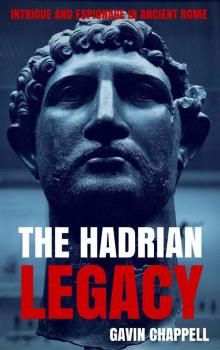 The Hadrian Legacy
The Hadrian Legacy On Hadrian's Secret Service
On Hadrian's Secret Service Murder in Hadrian's Villa
Murder in Hadrian's Villa The Sword of Wayland
The Sword of Wayland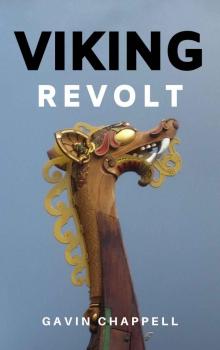 Viking Revolt
Viking Revolt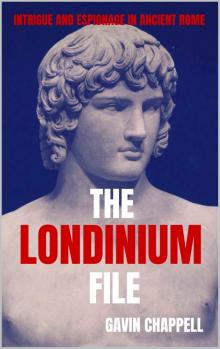 The Londinium File
The Londinium File The Gladiator Gambit
The Gladiator Gambit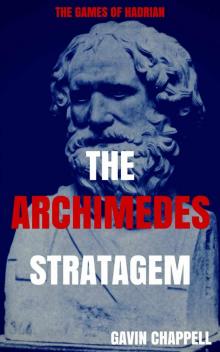 The Archimedes Stratagem
The Archimedes Stratagem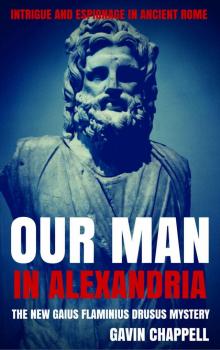 Our Man in Alexandria
Our Man in Alexandria Into the Void (The Dungeoneers)
Into the Void (The Dungeoneers) The Kingdom That Rome Forgot
The Kingdom That Rome Forgot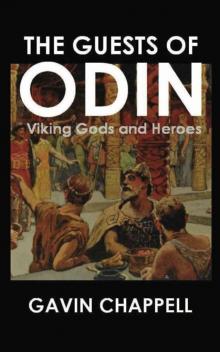 The Guests of Odin
The Guests of Odin